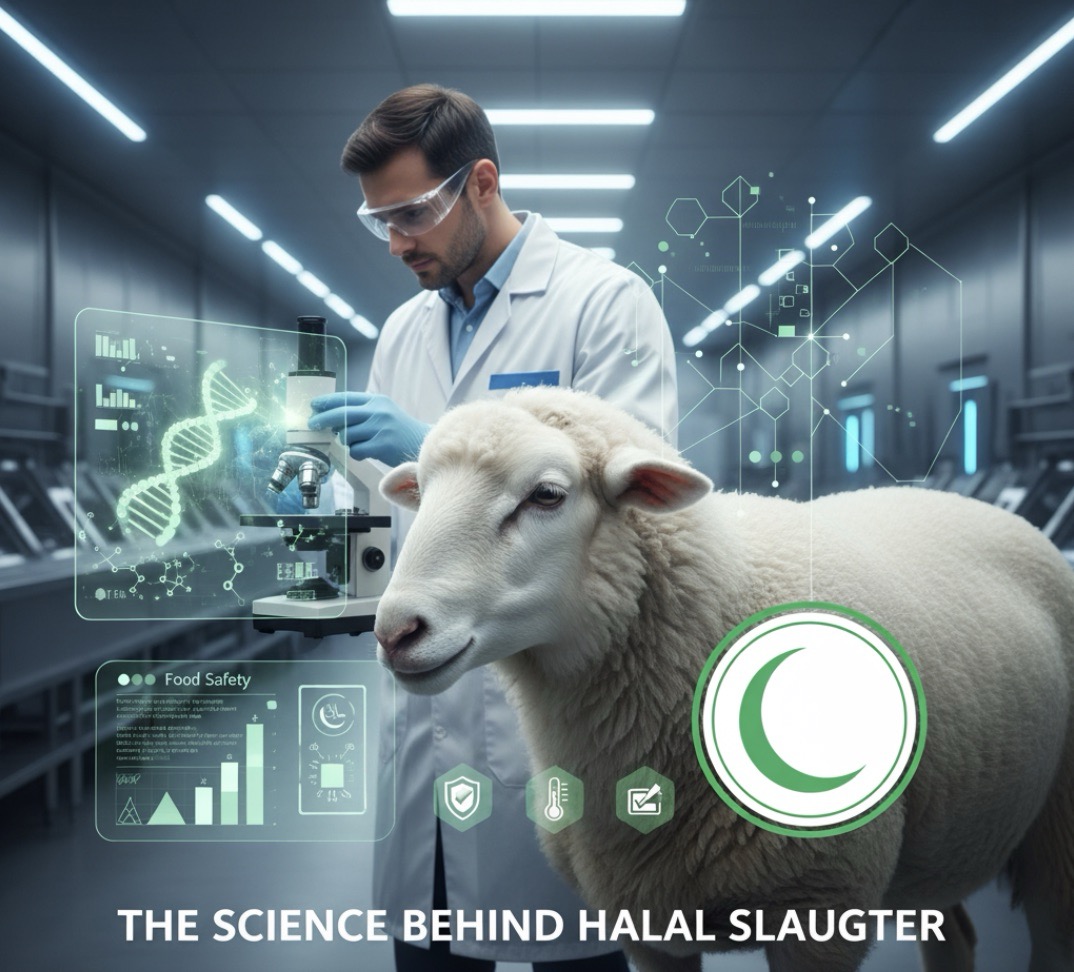The Science Behind Halal Slaughter: Modern Technology Meets Islamic Principles
What is Halal Slaughter?
Halal slaughter, known as dhabihah in Arabic, stems directly from the Quran and the teachings of Prophet Muhammad. The process requires that animals be treated with respect and compassion throughout their lives and that God’s name be invoked at the moment of slaughter. The method involves a swift, deep incision across the throat with a sharp blade, severing major blood vessels while keeping the spinal cord intact. This technique ensures rapid blood loss and loss of consciousness.
Beyond the mechanics of slaughter, halal encompasses a comprehensive ethical framework. Animals must be healthy, properly fed, and free from distress. They cannot witness the slaughter of other animals, and the blade must be sharpened out of their sight. These requirements reflect Islam’s broader emphasis on mercy and stewardship over creation, making halal not just a religious ritual but a holistic approach to ethical food production.
The Science of Animal Welfare
Modern animal welfare science validates many traditional halal practices. Research demonstrates that the swift severing of major blood vessels in the neck causes an immediate drop in blood pressure to the brain, resulting in rapid unconsciousness—typically within two seconds. This quick loss of consciousness minimizes pain perception, a finding that aligns with contemporary veterinary understanding of humane slaughter.
Pre-slaughter handling proves equally important. Halal standards require calm, gentle treatment of animals before slaughter, which science confirms reduces stress hormones like cortisol and adrenaline. Stressed animals produce meat with compromised quality—the muscle tissue becomes tough, and the pH balance shifts unfavorably. By mandating stress reduction, halal practices naturally produce better-quality meat while respecting the animal’s dignity.
When compared to some conventional methods that may involve rough handling or extended periods in holding pens, properly executed halal slaughter often surpasses industry standards for animal welfare. The requirement for a razor-sharp blade and skilled slaughterman ensures the cut is precise and quick, avoiding the prolonged distress that can occur with poorly maintained equipment or untrained workers.
Blood Drainage and Food Safety
The complete drainage of blood from slaughtered animals isn’t merely a religious requirement—it serves significant food safety purposes. Blood provides an ideal medium for bacterial growth, containing nutrients and moisture that microorganisms thrive on. By ensuring thorough blood removal, halal slaughter reduces the risk of contamination and extends the shelf life of meat products.
From a food science perspective, blood retention can lead to off-flavors, discoloration, and accelerated spoilage. The dark, pooled blood found in inadequately drained meat creates pockets where bacteria like Salmonella and E. coli can proliferate. Proper blood drainage results in lighter-colored, better-tasting meat with improved storage characteristics.
These practices align seamlessly with USDA and FDA regulations for hygienic meat production. Federal guidelines emphasize the importance of cleanliness and contamination prevention throughout the slaughter and processing chain. The halal requirement for complete blood drainage complements these standards, creating meat products that meet both religious requirements and public health expectations. Independent studies have shown that properly executed halal slaughter yields meat with lower bacterial counts compared to some conventional methods.
Modern Technology Supporting Halal
Technology has transformed halal meat production while maintaining the essential Islamic requirements that define the practice. Advanced restraining systems now keep animals calm and positioned properly without causing distress—a far cry from older methods that could frighten or injure livestock. These systems use gentler holds and reduce the time animals spend in restraint, addressing both welfare concerns and halal standards.
Blade technology has evolved significantly, with manufacturers producing specialized knives that maintain exceptional sharpness throughout processing. Temperature-controlled processing environments ensure meat quality while sophisticated monitoring systems track every stage of production. These technological advances support the slaughterman’s work without replacing the human element that halal requires.
Traceability systems represent perhaps the most significant technological contribution to halal certification. Digital tracking allows every animal to be traced from farm to retail, documenting feed sources, transport conditions, and slaughter procedures. This transparency gives certification agencies like Halal Watch the tools to verify compliance at every step, building consumer confidence through verifiable data rather than trust alone. Video monitoring, temperature logs, and electronic documentation create an audit trail that makes fraudulent claims far more difficult.
Halal Certification in the US
The role of halal certification agencies has become increasingly critical as the American halal market grows. Organizations like Halal Watch serve as independent verifiers, conducting thorough audits of facilities, reviewing procedures, and training staff on proper halal protocols. Certification isn’t a one-time stamp of approval—it requires ongoing monitoring, surprise inspections, and continuous compliance with established standards.
For consumers, certification provides assurance that products meet authentic halal requirements. With various interpretations and practices in the marketplace, certified products offer clarity for Muslims seeking to fulfill their religious obligations. For businesses, certification opens doors to a substantial and growing market segment. Companies serving schools, hospitals, restaurants, and retailers increasingly recognize halal certification as both a religious necessity and a mark of quality that appeals to diverse consumers.
Transparency defines reputable certification. Agencies publish their standards, maintain public lists of certified facilities, and respond to consumer questions. This openness builds trust and accountability, distinguishing legitimate certifiers from those offering questionable credentials.
Global Significance of Halal Standards
The halal food industry now represents a multi-trillion-dollar global market, with demand extending far beyond Muslim-majority countries. The United States exports significant quantities of halal-certified meat to international markets, making proper certification essential for American producers seeking to compete globally. Countries throughout Asia, the Middle East, and Africa require recognized halal certification for imported meat products.
Interestingly, non-Muslim consumers increasingly choose halal products, viewing the certification as an indicator of quality, ethical treatment, and careful oversight. The comprehensive nature of halal standards—covering animal welfare, hygiene, and traceability—resonates with consumers seeking transparency in their food supply. This broader appeal transforms halal from a niche religious requirement into a mainstream quality marker.
International standards bodies work to harmonize halal requirements across borders, though differences remain. American certification agencies like Halal Watch participate in these global conversations, ensuring US producers can navigate international requirements while maintaining the integrity of Islamic principles.
Conclusion
Halal slaughter exemplifies how ancient religious wisdom can align with modern scientific understanding. The practices mandated by Islamic law fourteen centuries ago now find validation in contemporary animal welfare science, food safety research, and quality standards. Technology enhances these traditional methods without replacing the human judgment and spiritual intentionality that define halal.
Proper certification through reputable agencies ensures that both the letter and spirit of halal principles are maintained in an increasingly complex food system. As consumers become more conscious of how their food is produced, the transparency and ethical framework inherent in halal standards offer a model for building trust. Whether motivated by faith, ethics, or quality concerns, those seeking assurance in their food choices find halal certification a meaningful guarantee in an often opaque industry.







